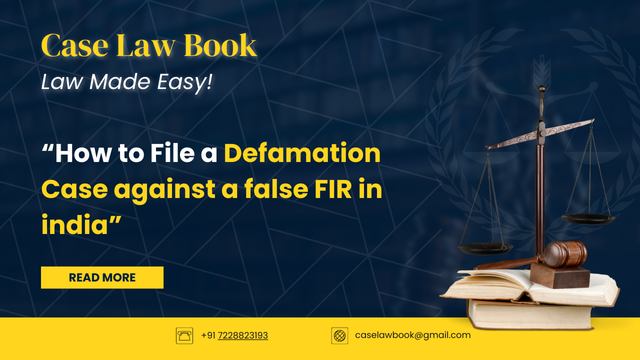Being falsely accused of a crime through a false FIR (First Information Report) is a distressing experience that can harm both your mental peace and your reputation. A false FIR not only subjects you to unnecessary legal proceedings but also affects your social and professional life. Filing a defamation case against such accusations can help you restore your reputation and seek justice against such false FIRs. This brief guide explains how you can pursue a Defamation Case Against a False FIR in India to safeguard your integrity and hold the perpetrators accountable.
Understanding Defamation and False FIRs: A Legal Overview
What is Defamation?
Under Section 356 of the Bharat Nyaya Sanhita (BNS), defamation involves statements—spoken, written, or implied—that harm a person’s reputation. For a statement to qualify as defamation, it must be false and cause reputational damage.
What is a False FIR?
A false FIR is a fabricated complaint filed with malicious intent to harm someone. Filing such an FIR is a punishable offense under Section 248 of the BNS, which deals with intentional false charges brought against a person with the intent to injure.
Why File a Defamation Case Against a False FIR?
- Restoring Reputation
Filing a defamation case publicly challenges the false allegations, helping to rebuild your credibility. Article 21 of the Indian Constitution protects the right to reputation as an integral part of the right to life and liberty. - Deterrence
Legal action sends a strong message to deter similar malicious acts in the future against you or anyone, potentially creating a deterrence over such misuse of law. - Compensation
Courts may award financial compensation for emotional distress, reputational harm, or financial loss resulting from the false FIR along with the cost during litigation.
Steps to File a Defamation Case Against a False FIR
1. Seek Legal Advice
Consult a lawyer experienced in criminal and defamation cases. They will guide you on the best approach to handle both the false FIR and the defamation proceedings.
2. Gather Evidence
Collect all documents and proof that counter the allegations in the FIR. Few illustrative examples include alibis, CCTV footage, or witness statements. Additionally, compile strong evidence suggesting reputational harm, such as negative media coverage, social media posts, or testimonials.
3. Cooperate with Investigations
Engage with the police investigation to clear your name. Provide evidence to expedite the process of disproving the allegations. Do not try to be hostile and follow the procedure for any ill-act may go against you, if not legally justifiable.
4. File a Counter-Complaint
Consider filing a complaint under Section 248 of the BNS against the person who lodged the false FIR.
5. Serve a Legal Notice
Before filing a defamation case, your lawyer may send a legal notice to the individual who filed the FIR, demanding an apology or retraction.
6. Initiate Legal Proceedings
If the legal notice fails, file a defamation suit in the respective court. The suit should outline the false allegations, their impact, and the damages you seek.
Key Legal Considerations
- Burden of Proof
You must prove that the FIR was false and also that it caused damage to your reputation. - Time Limit
Under the Limitation Act, 1963, a defamation suit must be filed within one year of discovering the defamatory statement.
Conclusion: Protecting Your Rights
Facing a false FIR can be overwhelming due to the potential incoming wave of media trials and societal judgement, but the Indian legal system offers remedies. Filing a Defamation Case Against a False FIR in India not only clears your name but also ensures justice is served. By taking timely action and seeking expert legal assistance, you can protect your reputation and prevent further harm. Your action can also act as deterrence for future offenders.
If you find yourself in this situation, consult a qualified lawyer and take the necessary steps to reclaim your peace of mind and reputation.
Want to learn more about Indian law in simple, easy-to-understand language? Explore our Case Law Book blog for articles and explanations that demystify complex legal concepts and answer your legal questions. We cover a wide range of topics to help everyone understand their rights and the legal system.
Note:
- This blog post is for informational purposes only and does not constitute legal advice.
- The specific laws and regulations may vary and are subject to change.
- It is always recommended to consult with a legal professional for personalized guidance on any legal matter.
- The examples provided are illustrative and may not reflect actual case scenarios.
Disclaimer: This blog post is for informational purposes only and should not be considered legal advice. If you are facing a legal issue, consult with a qualified attorney.
Also Read : Places of Worship Act 1991: Controversies and Legal Debates
